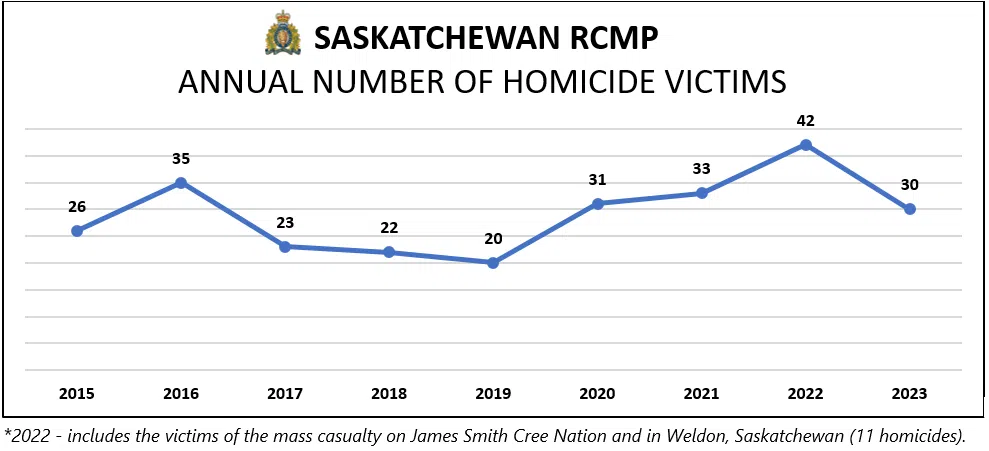The Saskatchewan RCMP is reporting a 50 per cent increase in murders and manslaughters over the past five years — and the Mounties say nearly half of the people charged were in the justice system before.
In a media release Wednesday, the RCMP said 44 per cent of the people charged with first-degree murder, second-degree murder or manslaughter in connection with the killings were on conditions, bail, parole or probation at the time of the incidents.
The Mounties noted that as of Thursday, amendments to the Criminal Code and current bail provisions will address prolific violent offenders.
“I am hopeful the amended bail provisions are a step in the right direction — because at the end of the day, those individuals who are not interested in rehabilitation or changing their lifestyle will continue to do harm to others and should not be released back into our communities,” Assistant Commissioner Rhonda Blackmore, the commanding officer of the Saskatchewan RCMP, said in the release.
“I am incredibly proud of our front-line officers and specialized units who continue to monitor, suppress and investigate these violent offenders — from ensuring individuals are complying with their release conditions, implementing initiatives to target prolific offenders, arresting those with outstanding warrants, to investigating homicides.”
According to RCMP statistics, there were 20 slayings in the Saskatchewan Mounties’ jurisdiction in 2019. In 2023, that number was 30, representing a 50 per cent climb over the five-year time frame.
The RCMP investigated 42 killings in Saskatchewan in 2022, including the 11 murders committed by Myles Sanderson on the James Smith Cree Nation and the nearby community of Weldon. That was the highest annual total since 2016, when there were 35 killings.
“It goes without saying that a homicide is worst-case scenario — but when an individual commits a homicide while on bail or release conditions, it is extremely discouraging and frustrating for our investigators,” Supt. Joshua Graham, the officer in charge of Saskatchewan RCMP Major Crimes, said in the release.
“In 2023, our Major Crimes unit had five instances where two to three separate homicides occurred in less than 48 hours. These clusters of homicides are alarming but no longer an anomaly.
“Our Major Crimes investigators continue to do an outstanding job despite not receiving any additional investigative resources since 2008. Their dedication, resiliency, and undeniable expertise is what contributes to solving 84 per cent of the homicides since 2015 with the ultimate goal of giving all victims’ families closure and answers.”
In an attempt to monitor offenders who are released back into Saskatchewan communities, the RCMP said it conducts proactive conditions checks to ensure the offenders are complying with their court-ordered conditions.
The Mounties said that between January and December of last year, officers conducted around 17,000 of those checks. The conditions can include abiding by curfews, not possessing weapons, not having contact with identified individuals and not entering certain communities, among others.
Last year, RCMP officers in Saskatchewan identified more than 15,800 court-ordered conditions that had been violated in their jurisdiction. Those were detected through proactive conditions checks as well as other interactions with officers, including traffic stops and responding to calls for service.
Those violations can result in Criminal Code charges for failure to comply with release order conditions.
The Mounties pointed to the Saskatchewan Serious Violent Offender Response (SVOR) program as a way to potentially reduce threats. RCMP officers, provincial and federal Crown prosecutors, and representatives of correctional services, municipal police services and the Canadian Mental Health Association Saskatchewan Division participate in the program.
“The SVOR is an evidence-based approach that monitors violent offenders for the purpose of ensuring they are complying with court-ordered conditions while providing co-ordinated services to reduce the likelihood of future reoffending – with the ultimate goal of keeping communities safe,” the RCMP release said.












